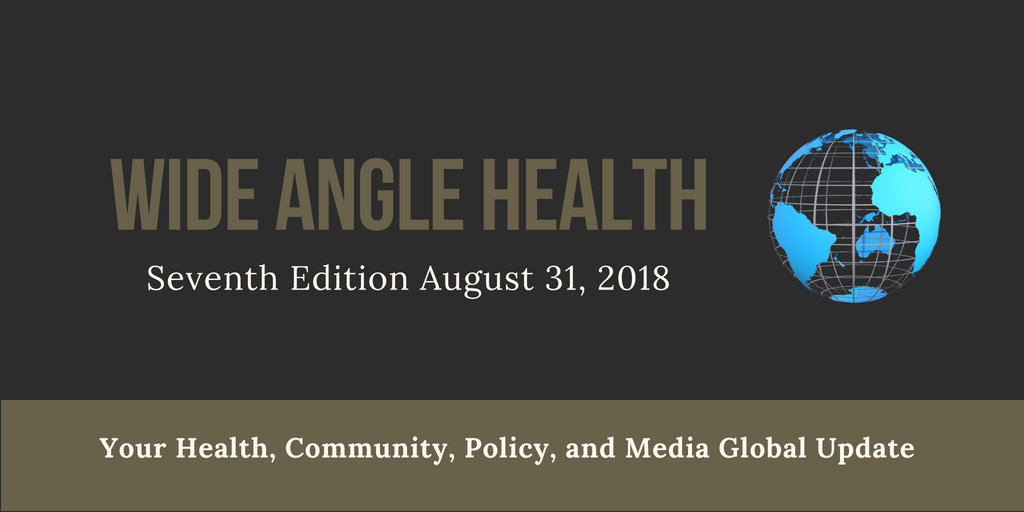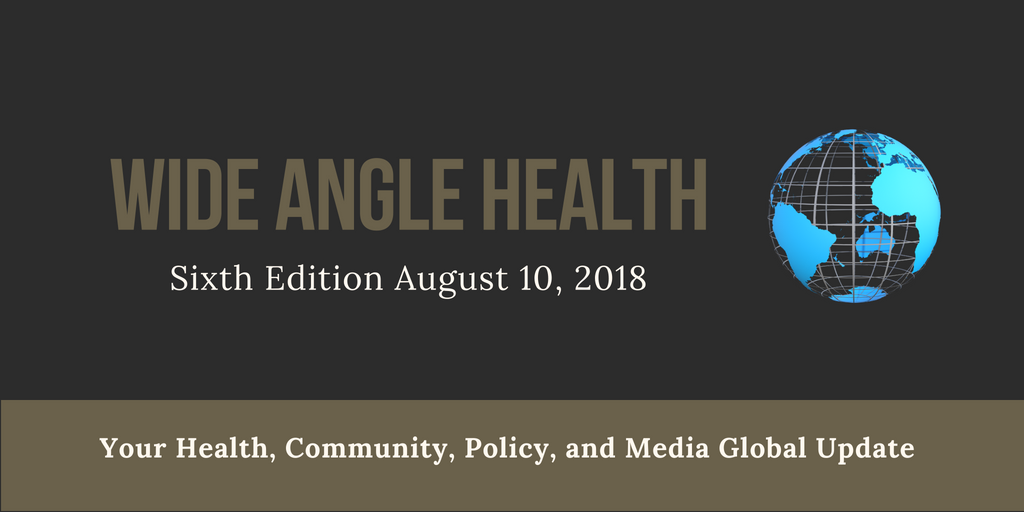This is HealthCetera’s global health policy and media action news update curated by Katherine (Kayte) Green. This bi-weekly round-up intends to keep our community apprised of up-to-date news, policies, economics, and ideas important to policy and social issues facing national and international health. This selection gathers information from a wide range of sources including, but not limited to: health associations and organizations, news sources, government agencies, academic publications, policy centers, and other national and international experts.
NATIONAL NEWS

The Future of Healthcare Spending
Healthcare spending and Health Savings Accounts
Expanding HSAs Could Exacerbate Inequalities and Increase Government Spending
-The Commonwealth Fund
Late last month, the House of Representatives passed, by a vote of 277 to 142, a bill that could allow for more money to be provided to health savings accounts (HSAs), for more of the population to have HSAs, and for HSA funds to be expanded to cover additional benefits such as gym memberships, over-the-counter drugs, and feminine hygiene products. “Supporters claim these new tax breaks, which will cost more than $40 billion over 10 years, will help make health care more affordable and less wasteful. Instead, these seemingly innocuous HSA extensions have the potential to make our health care system both less equitable and more costly.”
Why Americans Spend So Much on Health Care—In 12 Charts
-The Wall Street Journal
“Prices are hidden behind insurance deals, hospital consolidation pushes up costs and the health sector is a growing power in the economy. The U.S. spends more per capita on health care than any other developed nation. It will soon spend close to 20% of its GDP on health—significantly more than the percentage spent by major Organization for Economic Cooperation and Development nations.”
HHS Says Short-Term Plans Renewable Up To Three Years, But Not Guaranteed
-Inside Health Policy
Under New Rules, Cheaper ‘Short-Term’ Health Care Plans Now Last Up To 3 Years
-NPR Health News
“The Congressional Budget Office, the nonpartisan research office that estimates the budget effects of policy proposals, gave a larger figure, estimating that about 2 million mostly healthy people will buy short-term plans. This could have the effect of driving premiums slightly higher on the ACA exchanges, because healthier people will leave the market, according to the CBO.”
Senate Democrats To Force Vote On Elimination Of Short-Term Plans
-Inside Health Policy
“When Senate Democrats force a vote on this resolution under the CRA, the American people can see once and for all if Republicans stand with the Trump administration’s efforts to sabotage our health care system or if they stand on the side of the 130 million Americans with preexisting conditions,” Schumer said. — Ariel Cohen (acohen@iwpnews.com)
Trump Administration Delivers on Promise of More Affordable Health Insurance Options
-The Department of Health and Human Services
Trump’s losing fight against Obamacare
-Politico
Other News:
Framing a Pathway for Integrating Behavioral and Clinical Health Care
-Bipartisan Policy Center
Judge Orders Trump Administration to Find Hundreds of Deported Parents
-The Wall Street Journal
Policy Efforts:
Income, Poverty, and Health Inequality
-JAMA
An American Crisis – The Growing Absence of Black Men in Medicine and Science: Proceedings of a Joint Workshop Report
-The National Academy of Medicine
GLOBAL NEWS

Climate Change
Losing Earth: The Decade We Almost Stopped Climate Change
-The New York Times
“The world has warmed more than one degree Celsius since the Industrial Revolution. The Paris climate agreement — the nonbinding, unenforceable and already unheeded treaty signed on Earth Day in 2016 — hoped to restrict warming to two degrees. The odds of succeeding, according to a recent study based on current emissions trends, are one in 20. If by miracle we are able to limit warming to two degrees, we will only have to negotiate the extinction of the world’s tropical reefs, sea-level rise of several meters and the abandonment of the Persian Gulf. The climate scientist James Hansen has called two-degree warming “a prescription for long-term disaster.” Long-term disaster is now the best-case scenario. Three-degree warming is a prescription for short-term disaster: forests in the Arctic and the loss of most coastal cities. Robert Watson, a former director of the United Nations Intergovernmental Panel on Climate Change, has argued that three-degree warming is the realistic minimum. Four degrees: Europe in permanent drought; vast areas of China, India and Bangladesh claimed by desert; Polynesia swallowed by the sea; the Colorado River thinned to a trickle; the American Southwest largely uninhabitable. The prospect of a five-degree warming has prompted some of the world’s leading climate scientists to warn of the end of human civilization.”
The Lancet Countdown on health and climate change: from 25 years of inaction to a global transformation for public health (Report)
-The Lancet Countdown: Tracking Progress on Health and Climate Change
China could face deadly heat waves due to climate change
-MIT News
How Climate Change Contributed to This Summer’s Wildfires
-The New Yorker
Trump Unveils His Plan to Weaken Fuel Efficiency Rules
-New York Times
On August 1st, the EPA unveiled it’s “The Safer and Affordable Fuel Efficient Vehicles Proposed Rule for Model Years 2021-2026” proposal that will weaken regulations around fuel standards established during the Obama administration for the automotive industry.
Other News:
The Top 5 Issues In EU Medicines Policy For 2018 (Including IP)
-The European Public Health Alliance (AISBL)
This report by The European Public Health Alliance, funded through the European Union, outlines the top five policy issues for 2018 in Europe. The top 5 include:
1. Harmonising(sic.) Health Technology Assessment in Europe: a political minefield
2. Intellectual property incentives: the hottest topic in pharma
3. Is the intergovernmental avenue the only way forward?
4. The access to medicines debate and the political role of the EMA
5. The Empire strikes back: pharmaceutical companies attempt to silence “dissident” voices.
European Medicines Agency To Be Hit Hard By Brexit Move, It Says
-Health Policy Watch
Q&A: How mobile technology can help achieve the SDGs
-Devex
“At the 2016 Mobile World Congress, the industry committed to maximizing the contribution of mobile in supporting the Sustainable Development Goals. Today, this is evidenced through the dedicated Mobile for Development, or M4D, strategy at GSMA, the trade body that represents mobile network operators worldwide. The strategy recognizes nine target areas which hold opportunities to deliver innovations with social impact, including financial services, health, agriculture, digital identity, energy, water, sanitation, disaster resilience, and gender equality.”
A look at the Global Financing Facility’s goals, strategies, and learnings
-Devex Future for Health Partnerships
The Global Financial Facility (GFF) is an organization that addresses funding gaps in over 50 countries in the Global South that account for 96 percent of those experiencing health disparities, in particular, gaps in maternal, infant, and child health care. In September of 2017, the Bill & Melinda Gates Foundation donated $200 million dollars to GFF to help fill these gaps. The long-term strategic goal of GFF is to raise $2 billion over the coming years and expand its reach from working in four countries in 2015 to 50 countries in the next year.
“Global Financial Facility (GFF) helps countries understand their health burdens and set their priorities based on what will be the highest impact investment. That helps health ministers to build a country-driven investment case for finance ministers, and to get donors focused on the same objectives. As part of the process, GFF supports a multistakeholder platform in the countries where it works, bringing together government, civil society, United Nations organizations, and private investors.
Health is wealth Zambia’s Surgical Zeitgeist talks access to surgery
-European Investment Bank
“One-third of today’s global diseases require surgical intervention, but this type of service is not always accessible or safe. Past global and national public health policies in the developing world have usually been disease specific, focusing on treating the single problem (such as tuberculosis, HIV or malaria programmes) and not on strengthening the healthcare system and providing access to surgical care…Surgery is a pillar of the health system. Every human being may need basic to life-saving surgical care in his or her lifetime and only a strong healthcare system with improved surgical care capacity can support true universal health coverage and lead to sustainable national development…Surgery involves more than a single discipline and more than the sheer cutting and stitching up of human flesh and bone. It is an essential part of basic care, but it remains inaccessible and unaffordable for many people around the world.”
Is data consent in humanitarian contexts too much to ask?
-Devex
WEEKLY OP-ED
(Unsponsored and unsolicited)

Facial recognition poses serious risks. Congress should do something about it.
Technical advancements over the last decade have been tremendous but these technological innovations do not come without consequences. For example, facial recognition technology has been around for decades, but only recently has been put into the hands of the masses and is being used by large corporations, such as Google and Amazon, to track our movements online and off. A larger question is, what threats do facial recognition have on civil and privacy liberties? Could facial recognition be the next frontier in oppression?
In a recent piece in the Washington Post, Facial recognition poses serious risks – Congress should do something about it, the editorial team addresses the dangers of this powerful tool and questions the role that the Federal government should have in monitoring how and when it should be used.
“There is no question that facial-recognition technology can be a powerful tool. It has been used by airports to conduct efficient security checks, by health-care researchers to make diagnoses, and by police departments to track down suspects and missing people. Last month, it helped identify the suspect in the shooting deaths of five Capital Gazette employees in Annapolis.” (Read more)
-Bloomberg
ACLU COMMENT ON MICROSOFT CALL FOR FEDERAL ACTION ON FACE RECOGNITION TECHNOLOGY
-The ACLU
‘The Business of War’: Google Employees Protest Work for the Pentagon
-The New York Times
Amazon Workers Demand Jeff Bezos Cancel Face Recognition Contracts With Law Enforcement
-Gizmodo

Katherine (Kayte) Green works for the George Washington School of Nursing’s Center for Health Policy and Media Engagement. She holds a Master’s Degree in International Relations and Service Development. The focus of her research is gender equity and empowerment. She is passionate about working on unresolved social issues that deal with health, gender rights, LGBTQ, risk reduction, the arts, and justice. She has a background in social sciences and fine arts. Prior to joining GW, Kayte has worked in global and national health advocacy, development, and policy.
To subscribe and submit content to Wide Angle Health email: nursingpolicy@gwu.edu
This is HealthCetera’s global health policy and









